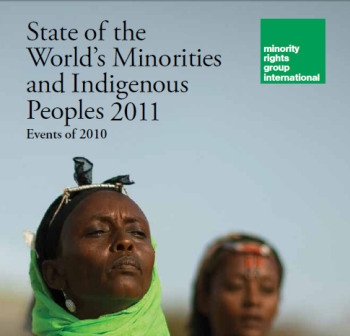MINORITY WOMEN TARGETED FOR RAPE
LONDON - Minority Rights Group International says in its 2011 annual report released today, women from minority and indigenous communities are targeted for rape and other forms of sexual violence, torture and killings specifically because of their ethnic, religious or indigenous identity.
 In the flagship annual publication, State of the World’s Minorities and Indigenous Peoples 2011, MRG documents cases from across the world showing how women from minority and indigenous communities often face disproportionately higher levels of violence and are targeted for attack in situations of conflict and in times of peace.
In the flagship annual publication, State of the World’s Minorities and Indigenous Peoples 2011, MRG documents cases from across the world showing how women from minority and indigenous communities often face disproportionately higher levels of violence and are targeted for attack in situations of conflict and in times of peace.
‘Discrimination against minorities worldwide is time and again experienced by women as physical violence,’ says Mark Lattimer, Executive Director of Minority Rights Group International. ‘In war and in peacetime, minority women are singled out for rape because they are less protected and less able to complain.’
The report cites cases from situations of armed conflicts, including Iraq, Afghanistan, Somalia, Sudan, Democratic Republic of Congo, Sri Lanka, Colombia, Guatemala, Kyrgyzstan and Burma, where women from minority and indigenous communities have suffered systematic sexual and other violence specifically because of their ethnic, religious, tribal or indigenous identity.
During the inter-communal conflict in Kyrgyzstan, in June 2010, ethnic Uzbeks reported widespread rape and sexual violence. In Iraq, Christian and other religious minority women have been forced to wear a head-scarf to protect themselves from violent attack, the report says. In Somalia, Bantu and other minority women suffer rape, including by police officers, in an environment of almost total impunity for the perpetrators. In North and South Kivu, in the Democratic Republic of Congo, Bambuti Pygmy women have experienced an epidemic of rape and extreme sexual violence throughout the long-running conflict.
In many of these countries rape has been used as a tool of war against women from minority communities.
In several countries – Iraq, Somalia, Sri Lanka and Colombia – minority women form a disproportionate number of those displaced due to conflict. In Colombia, a majority of displaced Afro-Colombians are women, many of whom head households, and face violence and sexual abuse from government forces and paramilitaries.
Minority and indigenous women are in particularly vulnerable positions because they often come from poor socio-economic backgrounds and live in remote areas. They have little access to justice and in many cases face discrimination from the police and the judicial system because of their minority status and because of their gender.
In India, for instance, Dalit women experience multiple levels of violence due to caste, class and gender. They face killing, rape, gang rape and custodial torture on a daily basis, across the country, the report says. In Uganda, in a study conducted by MRG in 2010, 100 percent of women from the Batwa community said they experienced physical violence and in many cases it was ongoing. According to the report, in the UK, there have been increasing reports of violence against Muslim women who are more easily identified by the head scarf they wear.
Like other women, minority and indigenous women also face violence from within their own community or their own families. Poverty, low literacy and social and economic marginalisation are some of the factors that contribute to the incidence of domestic violence within minority and indigenous communities. In Canada and Australia, according to the report, the limited available data show high levels of violence against women within indigenous groups, but there are indications that complaints from such women are treated less seriously by the authorities.
The report makes a strong case that, despite the levels of violence faced by minority and indigenous women, many of them are fighting for their rights to be recognised, and demanding justice.
‘Women are not just the victims of violence, they are also its leading opponents,’ says Shobha Das, Director of Programmes of Minority Rights Group International. ‘In many countries the struggle to stamp out sexual violence against minorities is being led by minority women activists themselves, sometimes at serious risk to their own safety.’
‘Much has been achieved over the last decade to highlight the scourge of violence against women around the world. But development agencies, governments and human rights activists need to realise that not all women face the same obstacles, and that violence against women often has a particular ethnic or religious dimension,’ Lattimer says.










